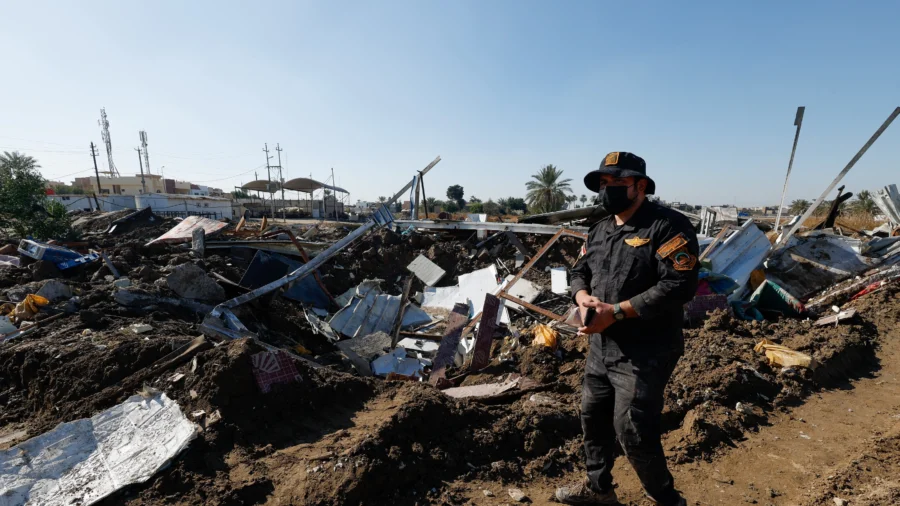The United States conducted airstrikes in Iraq targeting facilities allegedly linked to Iranian-backed Kataib Hezbollah and affiliated groups on Jan. 23, officials confirmed.
U.S. Central Command said the unilateral airstrikes were launched at 12:15 a.m. and targeted approximately three facilities used by the Kataib Hezbollah Shia terrorist group and affiliated groups in Iraq.
Kataib Hezbollah was designated as a terrorist organization by the U.S. State Department in 2009. Its key leader, Ahmad al-Hamidawi, was named a “Specially Designated Global Terrorist” in February 2020.
The strikes focused on what U.S. officials said were Kataib Hezbollah headquarters, storage, and training locations for rocket, missile, and one-way attack UAV capabilities.
At least one person was killed and one was injured following the U.S. airstrikes, CNN reports.
According to a post on Kataib Hezbollah’s Telegram channel cited by the publication, the individual killed was a Kataib Hezbollah fighter.
Separately, Jafar al-Hussaini, the military spokesman for Kataib Hezbollah, said the group “will continue to strike the enemy strongholds in support of our people in Gaza until the brutal, American-backed killing machine stops, and the siege is completely lifted.”
“This is the promise of the free,” the spokesman added.
The Epoch Times has contacted the Pentagon for further comment.
Attack on Air Base ‘Unique’
Tuesday’s airstrikes in Iraq were in response to repeated attacks on U.S. forces in Iraq and Syria, including the recent Jan. 20 attack on al-Asad Airbase in western Iraq, U.S. officials said.
That attack, in which the air base was hit by multiple ballistic missiles and rockets fired by Iranian-backed militants from inside Iraq, led to four U.S. personnel suffering traumatic brain injuries, according to U.S. Central Command, which carries out operations in the Middle East.
At least one Iraqi service member was also wounded.
Most of the missiles were intercepted by the base’s air defense systems, while others impacted the base, officials said.
In a press conference Monday, Sabrina Singh, deputy Pentagon press secretary, said the attack on the military base—which hosts a large majority of the roughly 2,500 American troops in Iraq and is located roughly 100 miles west of Baghdad—also damaged infrastructure.
The Pentagon official told reporters that the attack on al-Asad Airbase was also “unique” in that the barrage of missiles and rockets were fired “all at one time.”
“It was a larger-scale attack than we have seen before,” Ms. Singh said. “We’ve usually seen one or two missiles that have landed either nearby a base or have been not as close as some of these got. It was just a larger barrage of an attack than we had seen.”
There have been at least 151 attacks on service members in Iraq and Syria since Oct. 17, according to the Defense Department, with the attacks escalating in the wake of the Israel–Hamas war.
US ‘Will Not Hesitate to Take Necessary Action’
Defense Secretary Lloyd Austin called the U.S. retaliatory strikes “necessary and proportionate” in a separate statement on Tuesday.
“These precision strikes are in direct response to a series of escalatory attacks against U.S. and Coalition personnel in Iraq and Syria by Iranian-sponsored militias,” Mr. Austin said.
The senior Biden administration officials also praised the “skill and professionalism with which our personnel planned and conducted these strikes and the continued efforts of our troops on the ground as they work with regional partners to further dismantle and degrade ISIS.”
“The President and I will not hesitate to take necessary action to defend them and our interests. We do not seek to escalate conflict in the region,” he continued.
“We are fully prepared to take further measures to protect our people and our facilities. We call on these groups and their Iranian sponsors to immediately cease these attacks.”
Tuesday’s strikes by U.S. forces also came one day after the U.S. and United Kingdom carried out another round of coordinated retaliatory strikes on what they said were targets in Yemen controlled by the Tehran-backed Houthi rebels.
Those strikes were in response to “continued illegal and reckless Houthi attacks against vessels transiting the Red Sea and surrounding waterways,” officials said.
Australia, Bahrain, Canada, and the Netherlands supported the strikes, according to a statement issued by the White House.
“These strikes were designed to disrupt and degrade the capability of the Houthis to continue their attacks on global trade and innocent mariners from around the world while avoiding escalation,” officials said.
“The thirty-plus attacks that the Houthis have launched on commercial and naval vessels since mid-November constitute a threat to all countries that rely on international maritime shipping. We condemn these attacks, and demand an end to them.”
Reuters contributed to this report.
From The Epoch Times

